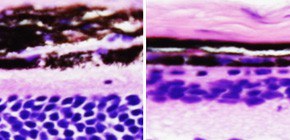
Semaphorin therapy successfully prevented progression of retinal degradation
Under the leadership of Professor Atsushi KUMANOGOH and Assistant Professor Satoshi NOJIMA , Graduate School of Medicine, Osaka University, Dr. Masayo TAKAHASHI , project leader, Kobe Institute, Riken, and Professor Jun-ichi, TAKAGI , Institute for Protein Research, Osaka University, a group of researchers have clarified that mutations in only one amino acid of Semaphorin 4A (Sema4A) protein caused retinal pigment degeneration. Furthermore, this group has demonstrated in animal experiments that Sema4A gene therapy was able to prevent the progression of retinal detachment.
Retinal pigment degeneration is said to be one of the three causes of acquired blindness. A Semaphorin molecular group has attracted attention as a key molecule and drug target for human diseases in that it is involved in neural development, immunity, blood vessels, bone diseases, neurodegenerative disorders, metastasis and infiltration of cancer.
Abstract
Semaphorin 4A (Sema4A) has an essential role in photoreceptor survival. In humans, mutations in Sema4A are thought to contribute to retinal degenerative diseases. Here we generate a series of knock-in mouse lines with corresponding mutations (D345H, F350C or R713Q) in the Sema4A gene and find that Sema4AF350C causes retinal degeneration phenotypes. The F350C mutation results in abnormal localization of the Sema4A protein, leading to impaired endosomal sorting of molecules indispensable for photoreceptor survival. Additionally, protein structural modelling reveals that the side chain of the 350th amino acid is critical to retain the proper protein conformation. Furthermore, Sema4A gene transfer successfully prevents photoreceptor degeneration in Sema4AF350C/F350C and Sema4A−/− mice. Thus, our findings not only indicate the importance of the Sema4A protein conformation in human and mouse retina homeostasis but also identify a novel therapeutic target for retinal degenerative diseases.

To learn more about this research, please read the full research report entitled " A point mutation in Semaphorin 4A associates with defective endosomal sorting and causes retinal degeneration " at this page of the Nature Communications website.
Related link :
